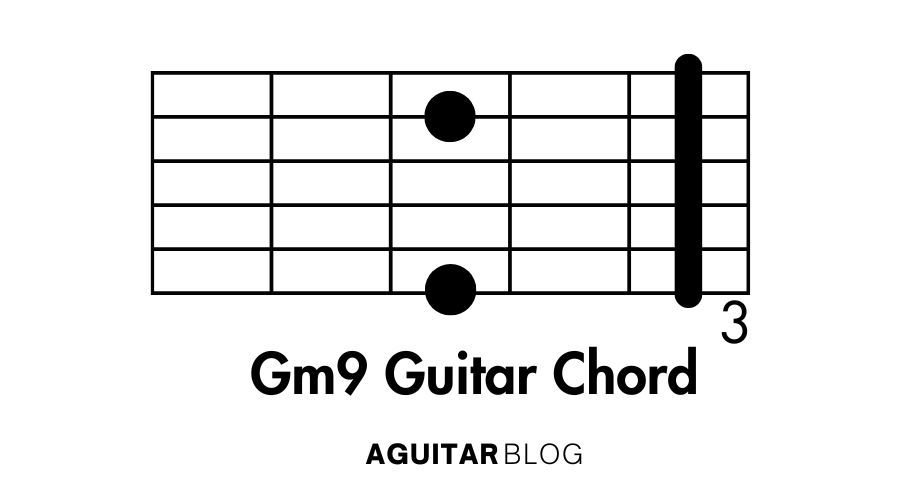The Gm9 guitar chord (G minor 9) is a beautifully complex and expressive chord that blends the sadness of the minor chord with the richness of the ninth and seventh intervals. It’s a staple in jazz, soul, and contemporary music, often used for its deep, emotional sound.
What is the Gm9 Guitar Chord?
The Gm9 chord is a minor ninth chord that includes the G minor triad (G, Bb, D), the minor seventh (F), and the major ninth (A). This combination creates a chord that is both melancholic and sophisticated, with a smooth but complex sound.
Notes in the Gm9 Chord:
- Root: G
- Minor Third: Bb
- Perfect Fifth: D
- Minor Seventh: F
- Major Ninth: A
This blend of minor, seventh, and ninth intervals gives the Gm9 its rich, jazzy flavor, making it perfect for emotional, expressive moments in music.
How to Play the Gm9 Guitar Chord

Open Gm9 Chord (Simplified Version):
- Index finger: Place on the 1st fret of the A string (5th string).
- Middle finger: Place on the 3rd fret of the D string (4th string).
- Ring finger: Place on the 3rd fret of the G string (3rd string).
- Let the low E string ring open (6th string).
- Let the high E string ring open (1st string).
Strum all six strings to produce the full, emotional Gm9 sound.
Barre Chord Shape for Gm9 (Root on the 3rd Fret):
- Index finger: Barre all strings on the 3rd fret.
- Ring finger: Place on the 5th fret of the A string (5th string).
- Pinky finger: Place on the 5th fret of the D string (4th string).
- Middle finger: Place on the 4th fret of the G string (3rd string).
Strum all six strings for the full, vibrant sound of Gm9.
Video Tutorial Gm9 Guitar Chord
For visual learners, a step-by-step video tutorial can make mastering the Gm9 Guitar Chord much easier. Here’s a helpful guide for you:
Common Mistakes and Tips for Playing the Gm9 Guitar Chord
Common Mistakes:
- Muted Strings: Ensure that your fingers aren’t accidentally muting the strings that should be ringing out, especially with barre chords.
- Buzzing Notes: Make sure to press the strings firmly enough to avoid buzzing, especially when barring.
- Inconsistent Pressure: Focus on applying consistent pressure across all strings to ensure that every note rings clearly.
Tips for Success:
- Start with the open version of the Gm9 before progressing to the barre chord shape.
- Practice transitioning between Gm9 and other minor chords like Gm, Dm, or Am for smoother shifts.
- Use a metronome to ensure your timing remains steady as you practice switching between chords.
Chord Progressions Featuring the Gm9 Chord
Common Progressions:
- Gm9 – C9 – Fmaj7 – Gm9: A beautiful, jazzy progression that offers tension and release.
- Gm9 – Ebmaj7 – F7 – Gm9: Adds complexity and emotional depth to a progression.
- Gm9 – Cm7 – F7 – Bbmaj7: A common jazz progression that highlights the richness of Gm9.
Songs Featuring the Gm9 Chord
- “So What” by Miles Davis
- “Lovely Day” by Bill Withers
- “Cantaloupe Island” by Herbie Hancock
Practice Tips for the Gm9 Chord
- Strengthen Your Fingers: Barre chords can be tough for beginners, so work on your finger strength and hand position to avoid muted strings.
- Practice Arpeggios: Try playing the individual notes of the Gm9 chord as an arpeggio to get more familiar with the chord’s sound.
- Experiment with Rhythm: The Gm9 chord works beautifully with different strumming or fingerpicking patterns, so experiment to find what works best for the song you’re playing.
Conclusion
The Gm9 guitar chord is an expressive and emotionally charged chord that adds depth and richness to your playing. With its mix of minor, seventh, and ninth intervals, it’s perfect for jazz, soul, and contemporary music. By practicing both its open and barre chord versions, you can begin to integrate this lush chord into your music and take your guitar playing to the next level.